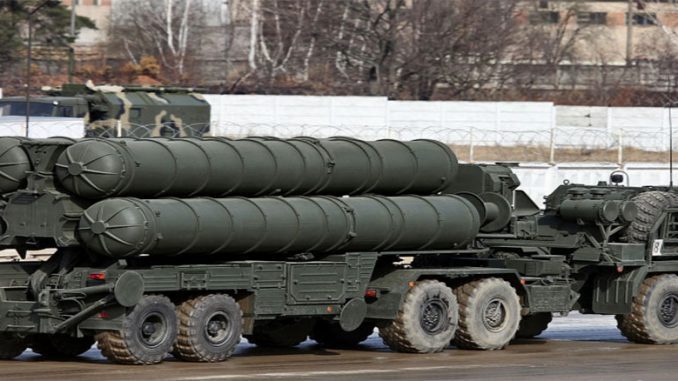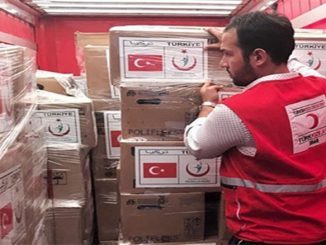
Turkey is likely to reach a final agreement with Russia to purchase S-400 long-range air missile defense systems, according to Turkish Defense Minister Fikri Işık.
”Turkey certainly needs a missile defense system and started a program with the aim of developing our domestically produced system. This program takes time, thus we have held negotiations with different countries to fulfill Turkey’s urgent requirement and it seems as though Russia is the most suitable candidate for fulfilling the country’s need at the moment,” Minister Işık said in a televised interview.
Turkey and Russia have engaged in ongoing talks regarding Turkey’s cooperation with Russia in the defense sector – specifically the d S-400 missile system – since the Russian-Turkish rapprochement in August 2016.
“Turkey is interested in S-400 systems. Talks are underway and the key issue is financing,” Chemezov told journalists on the sidelines of the International Defense exhibition (IDEX 2017). Turkish Foreign Minister Mevlüt Çavuşoğlu said on Feb. 21 that negotiations for the S-400 air defense missile system with Russia are “continuing positively.”
NATO factor
Turkey’s long desire to purchase a long-range air missile defense system has been on the international agenda since 2013, when Turkey’s Military Procurement Agency, the undersecretariat for the Defense Industry (SSM), chose the China Precision Machinery Import-Export Corporation (CPMIEC) FD-2000 (HQ-9) long-range missile defense system in September 2013. Even though the Chinese company’s offer was the best deal among other competitors in terms of price and technology transfer, Turkey had to cancel this tender due to heavy pressure from NATO in November 2015. However, this time Turkey is likely to stand firm against NATO pressure. Responding to the question about NATO’s reaction if Turkey decides to buy Russian S-400s.
Defense Minister Işık said that Turkey expects NATO to show due understanding toward this decision, noting: ”I believe that they [NATO] will understand Turkey’s decision [to purchase S-400s] and will empathize,” Minister Işık said. ”Even some [other] NATO members have been using systems purchased from countries outside of NATO,” he added.
”In this field we have three criterion which are price, technology transfer and time of delivery. As a sovereign state, we can cooperate with any country that fulfills these
requirements,” Presidential spokesman İbrahim Kalın said, ”There are several NATO countries that already use non-NATO systems. So we don’t expect any controversy to erupt within NATO.”
What do analysts say about the deal?
The possibility of Turkey purchasing a Russian system has dawn mixed responses from analysts.
“I think this could be a genuine effort,” said Sam Bendett, a researcher specializing in Russian military affairs at CNA Corp. “It certainly makes the U.S., NATO and Israel take notice.”
Other experts such as Mike Kofman, a fellow specializing in Russian military affairs at the Wilson Center, are not convinced. “This is all a political leverage game,” he said. “Turkey is up to the same game as they were with China.”
Turkey had selected the Chinese-built HQ-9 air defense system in 2013 for a similar tender, but that effort was seen by many analysts as an effort to spur Western technology transfers. “It was a cheap Turkish attempt to get better terms from Western producers that would include some kind of technology transfer,” Kofman said. “They are now trying the same tactic with Russia. As though Russia would transfer technology to them, helping to make the Turkish defense industry a stronger competitor—or as a secondary issue—sell its best air defense to a NATO country. Turkey is again using these talks to try and blackmail NATO countries into air defense sales.”
Bendett, however, believes that the Turkish effort to buy the S-400 could be genuine. “Turkey doesn’t have a missile defense system that the S-400 would represent. At the same time, Turkey must have been paying very close attention to threats posed to Saudi Arabia by Houthi rebels and their sophisticated array of technologies that can directly threaten the Saudi homeland.”
Bendett said that the drive to acquire the S-400 is part of an overall Turkish drive to modernize their forces and achieve technological independence from the West. “This purchase is in line with Turkey’s continued drive for military modernization that will have them designing, building and fielding a wide range of state-of-the-art land, air and sea-based weapons,” Bendett said. “This drive for military-technological independence is not complete without sophisticated long-range air missile defense system that S-400 represents.”
Kofman is skeptical about the prospects that Russia would sell Turkey an advanced weapon system like the S-400. “Why would Russia sell it to them? Especially given that they have contingencies with Turkey—as in they are always thinking about the fact that they may have a military incident with Turkey,” Kofman said.
Bendett, however, said that an S-400 sale would represent an opening for Russian industry in Turkey that Moscow has long coveted. “It represents Moscow’s entry into a relatively closed-off Turkish military market that until recently was fielding exclusively NATO hardware, Bendett said. “As far as the shooting of a Russian Su-24 fighter-bomber by the Turks, it’s a safe bet that such confrontation is a thing of the past and an aberration in bilateral relations between Moscow and Ankara – both are interested in securing air and land space in and around Turkey.”.



